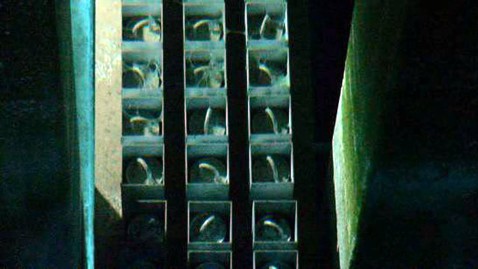White 'Cobwebs' Found in Nuclear Waste Pool

Radioactive nuclear fuel rods at Savannah River National Laboratory. White cobweb-like material appears near top of some containers. Image: U.S. Department of Energy.
At the Savannah River National Laboratory in South Carolina, where, among other things, spent fuel rods from nuclear power reactors are stored, workers last fall reported a white substance, similar to cobwebs left by spiders, in one of the pools of water where the radioactive rods are kept.
"We observed it, it was unusual, it appears to be biological in nature but we don't know that for sure," said Will Callicott, the lab's manager of executive communications. "It doesn't seem to be doing any harm."
It has, though, prompted some blaring headlines in tabloids in the U.K.
"'Mutant' spider fears at nuclear waste lab," said The Sun.
"Could Spider-Man become a reality?" asked the Daily Mail.
If you're not into superheroes, Spider-Man was a teenager who took on extraordinary powers after he was bitten by a radioactive spider. In reality, scientists say they still have many questions about what radiation does to living things.
It is certainly harmful in large doses, breaking down tissue and damaging DNA, but American scientists who studied the evacuated wasteland around the Soviet Chernobyl nuclear plant after the 1986 accident there said they got a surprise. At least 135,000 people were forced to move - but the area they abandoned became a haven for wildlife.
"If I were going to be a moose," said Robert Baker of Texas Tech University, "I would want to live in the exclusion zone." Baker and a colleague, Ron Chesser, tracked the plants and animals around the wrecked nuclear plant in the decades after the accident.
"They're going to live a lot longer lives, because humans are worse for them than the radiation was," Baker said.
Staff members at Savannah River say they have taken a small sample of the "string-like growth" found on the ends of the spent fuel racks, but Callicott said they will not have a full report until March on what it is.